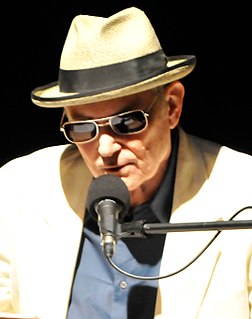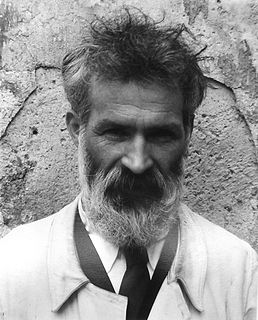A Quote by Michael C. McMillen
The idea of flux, kind of constant change, whether it be our sense of time or geological time or cosmic time. It's always there, and I think that maybe it's a way of dealing with the idea of mortality, trying to acknowledge the fact that all things change, and whereas, maybe death is the end of one state of being it's the beginning of something else. I'm not talking about going to heaven or being reincarnated as a toad, I'm talking about the idea that the molecules in our bodies, or at least the atoms, were here at the beginning of the universe, and the sense that we are basically matter.
Quote Topics
About
Acknowledge
All Things
Always
Atoms
Basically
Beginning
Being
Bodies
Change
Constant
Cosmic
Dealing
Death
Else
End
Fact
Flux
Geological
Geological Time
Going
Going To Heaven
Heaven
Idea
Kind
Least
Matter
Maybe
Molecules
Mortality
Not Talking
Our
Sense
Something
Something Else
State
Talking
Things
Things Change
Think
Time
Toad
Trying
Universe
Way
Were
Whereas
Whether
Related Quotes
We're living history all the time, in the papers, in the news, you think about stuff and it goes into your brain and you think about it and it comes out somehow. You have an idea; you've heard a phrase, or you're angry, or something disturbs you, or something seems paradoxical to you, you explore that idea, much like a writer would explore maybe an idea through metaphor. Maybe artists use their vehicle to explore ideas, so I think the things that interest me are the kind of idea of continuous change and how nothing stays the same and it's always disintegrating into something more.
It's about being in a race with time - just having a strong sense of mortality, and the idea of, How much time do you have left? How do you want to spend it? What I always come up with is: keep on writing, keep on working. But you can become sterile. It's become a matter of trying to find inspiration someplace outside of my own head, which I've been using exclusively for too long.
Perhaps we should stop talking about being faithful to have a quiet time with God each day, as if we were doing something to earn a reward. It would be better to talk about the privilege of spending time with the God of the universe and the importance for our own sake of being consistent in that practice.
I think at the beginning of a project, you decide if you're in love with the idea and what it's about, or what you think it's about at that time at least. Then you commit to it, and once you've commit to it no matter what, no matter how many self doubts you have, you're in it. The ship's sailed, you can't turn around.
I think about things like the fact that nobody knows what time is. Time is what? Nobody can describe it, even physics or math or anything else. But it is what we continuously experience. It's the state of our unfolding, in a way, and in that sense that the continuous reopening of reality is what I think of as, perhaps, a worldview.
I'd say, 90 percent of the time, I get an idea, like, within 10 seconds of somebody telling me what their whole thing is about. And usually that flash of an idea, it's what I always go with. It might change slightly, but in general, that's pretty much it. To get me to change the entire idea is pretty tough.
I wasn't thinking about history. I was thinking about how we were going to end segregation at lunch counters in Atlanta, Georgia.We would have never thought about making history, we just thought: Here is our chance to get out our sense of rejection at this kind of racial discrimination. I don't know that there was a time that anybody growing up in the South wasn't enraged about being segregated and being discriminated against.
Now we cannot...discover our failure to keep God's law except by trying our very hardest (and then failing). Unless we really try, whatever we say there will always be at the back of our minds the idea that if we try harder next time we shall succeed in being completely good. Thus, in one sense, the road back to God is a road of moral effort, of trying harder and harder. But in another sense it is not trying that is ever going tobring us home. All this trying leads up to the vital moment at which you turn to God and say, "You must do this. I can't.






































